
by Karyn Wills | Nov 4, 2013 | Being Thankful, Brothers, Childhood, Family, Family Travel, Friendship, Home, Inspirational, Kids, New Zealand, Older Children, Parenting, Relationships, Siblings, Traditions, Travel, Uncategorized, Vacationing, World Motherhood, Younger Children
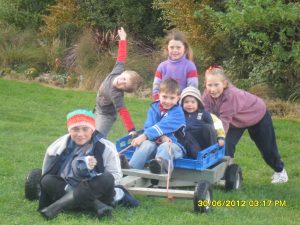 I have three sons and they are a lot of fun. They are also a lot of noise, mess and busyness.
I have three sons and they are a lot of fun. They are also a lot of noise, mess and busyness.
They adore one another most of the time and loathe one another at other times. Needless to say, living in a small house can get a little hectic and the fact that we live a car trip away from most of the boys’ friends—and I don’t always want to drive to fetch or deliver children—means that, from time to time, my boys can have a little too much of one another.
We are one small family and that can make us all tiresome to one another – no matter how strong the love between us.
The healthiness of living in an isolated, nuclear family unit has always bothered me a little. Not that living with my extended family or my in-laws would suit me, or them I suspect, either. But the cousins. Oh my goodness. The wonder of having cousins around – that appeals to me.
With cousins there is the common bond of grandparents and other family members, and the common history and the common family rituals. There is the emotional connection of knowing they all belong together, and the emotional connection of having been all together for their life times.
But, what I really love is the bond I see between our boys and all of their cousins in terms of visible affection and loyalty. When we have been away on holiday together, older cousins have often taken our boys off for adventures or have played with them, especially as babies and toddlers, so I could have a break. Younger cousins provide opportunities for my older boys to teach and help, in their turn. Sometimes it’s just fun to hang out together.
With their cousins, my boys are learning that things their brothers have said to them repeatedly, and they have ignored, are often the same opinions of others – and their cousins are not afraid to tell them so, sometimes bluntly. They are learning a higher level of co-operative skills and greater negotiation techniques, than they get to use with just two others. They are learning to walk away, when they need to walk away, and they are learning when it is appropriate to comment on another’s behaviour and when it is best to stay silent.
Like their brothers, their cousins love them. Unlike their brothers, their cousins are listened to. Like their friends, their cousins enjoy playing with them and will tell them to go away, when they‘ve had enough – but only for a short while. Unlike their friends, they cannot be transient members of their lives. And that last point, in particular, I love.
Do your children have good relationships with their cousins? Do you see a deeper bond between your children and their cousins, than with their friends?
Karyn is a teacher, writer and solo mother to three sons. She lives in the sunny wine region of Hawke’s Bay, New Zealand in the city of Napier.
More Posts

by Karyn Wills | Sep 2, 2013 | Brothers, Childhood, Education, Family, Life Balance, Motherhood, Nature, New Zealand, Parenting, World Moms Blog, World Motherhood, Younger Children
 When my boys were learning to roll over, I never stopped them from bumping their heads on the floor. We had carpet, vinyl and tiles, and they had access to all of those surfaces and often rolled from one to another. By the end of the first week there had been a few bangs and tears, but nothing that couldn’t be sorted with a cuddle and rock in my arms – and they had all learned to lift their heads up as they rolled.
When my boys were learning to roll over, I never stopped them from bumping their heads on the floor. We had carpet, vinyl and tiles, and they had access to all of those surfaces and often rolled from one to another. By the end of the first week there had been a few bangs and tears, but nothing that couldn’t be sorted with a cuddle and rock in my arms – and they had all learned to lift their heads up as they rolled.
I didn’t really think about this approach much but assigned it to other events as they grew. I did things like: holding my hand over the corner of a table when they toddled by; casually pointing out the floor was wet after I had mopped it; physically turning them around as they crawled down our concrete steps, so they could get down backwards; making sure they had one bed they could bounce on; and showing them how to get out of the trees they had climbed. As a result by the age of four they could all do things like; cut food and sticks using sharp knives, get themselves out of tight spots, and use a battery-drill and an iron without hurting themselves. By then they knew the difference between tools and toys.
I never pushed them or even encouraged them to do these things; I just (mostly) allowed them to as they were inclined to, taught them a few tricks, and turned up with plasters and cuddles when things didn’t go according to plan.
I have come to accept that children are driven to seek a certain amount of danger and I have found the more I have allowed my boys to set the pace of their ‘dangerous’ behaviours the more self-assured and capable they have become, and more aware of the risks NOT to take.
They occasionally have bitten off more than they could chew (when four years old, our eldest decided to ride around our block alone on his bike, he didn’t want to do that again for another two years) but most often than not they have taken small steps, fast. I often see children who have not been allowed to take the same small steps and they seem, to me, to be either too timid to take any chances or they over estimate their abilities to truly dangerous levels.
There seem to be two strong opposing forces in New Zealand parenting at the moment. One in which ‘safety first’ is the catch phrase, and the other which emphasises the importance of children being allowed to take measured risks. It seems I’ve ended up on one side of this debate without even trying, but now am really pleased that I have taken the approach I have taken.
What’s the approach to danger in your house? Do you think children need to be kept safe or that they need to learn to manage danger?
This is an original post to World Moms Blog from our writer in New Zealand, Karyn Van Der Zwet
The photograph used in this post is credited to the author.
Karyn is a teacher, writer and solo mother to three sons. She lives in the sunny wine region of Hawke’s Bay, New Zealand in the city of Napier.
More Posts

by Karyn Wills | Jun 3, 2013 | Babies, Being Thankful, Health, Kids, Life Balance, Maternal Health, Motherhood, New Zealand, Nutrition, Parent Care, Pregnancy, World Motherhood, Younger Children
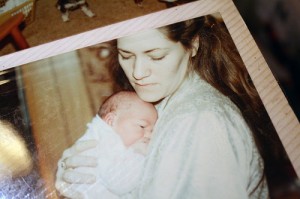 I had my third baby when I was 41. Many people told me I was bonkers and a few refused to congratulate me, but those who knew how it felt to long for a baby, whether that baby was number one or number six, were as delighted as I was.
I had my third baby when I was 41. Many people told me I was bonkers and a few refused to congratulate me, but those who knew how it felt to long for a baby, whether that baby was number one or number six, were as delighted as I was.
I was unfit, I knew that once the baby came I would feel tired, and I knew that I would have no time to myself. We already had one son who felt secure with strong boundaries and a gazillion hugs a day, and another who felt truly secure only while he was attached to my body. I knew that I would have to take each day, each hour, perhaps each minute as it came.
This was my self-imposed Everest: to give completely of myself until all the boys chose to pull away from me or manage my small nudges out of the nest, in order that they properly develop their wings. I figured things would begin to get somewhat easier at around the 18 month to two year mark. A friend, who had also had a third baby in her 40s, said it would take four years. I didn’t believe her.
I hadn’t counted on a 24 hour labour followed by a massive bleed on the operating table during an emergency C-Section. I hadn’t planned on premenopausal bodily hiccups. I never imagined I’d feel like I was churning through porridge day after day, after day, after day. But that’s what I got.
Just before Christmas last year I could stand it no longer. I was barely functioning, and I truly felt like this level of energy was my lot. I had three energetic and wonderful boys who needed a Mum with some oomph and pizzazz. I did a breathing rate test off the internet, and my results were worse than a heavy smoker and the same as someone in heart-failure. I went to the doctor.
It was then that I discovered that my iron and haemoglobin levels were extremely low – I joke that I was three quarters dead. Thankfully, my vitamin B levels were fine, my thyroid was doing its happy dance, and I passed the depression test. I got my iron levels sorted and began to feel a bit better.
Still, I wasn’t feeling great and I did wonder, again, if this amount of energy was my lot.
I tweaked my diet. I began rising earlier and going to bed at the same time as the boys. Our baby turned three and a half, and then three and three quarters.
And now, finally, after close to four years, I am almost back to myself. I cannot possibly regret having a gorgeous and much loved child in my 40s. I cannot possibly regret any of the time or energy I have put into any of my beautiful boys. But I can tell you this in complete confidence:
I am damned pleased to be on this side of the mountain!
How did life events affect how you coped with parenting your babies and toddlers?
This is an original post to World Moms Blog from our contributor in New Zealand, Karyn.
The image used in this post is credited to Lindsey Turner. It holds a Flickr Creative Commons attribution license.
Karyn is a teacher, writer and solo mother to three sons. She lives in the sunny wine region of Hawke’s Bay, New Zealand in the city of Napier.
More Posts

by Karyn Wills | Apr 25, 2013 | Cultural Differences, Eye on Culture, Human Rights, Humanity, New Zealand, World Moms Blog, World Voice
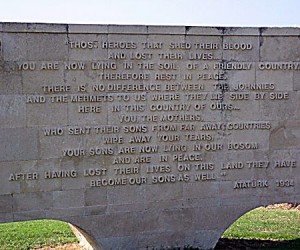 So, you have one national day? Here in New Zealand we have two…sort of.
So, you have one national day? Here in New Zealand we have two…sort of.
The official national day for New Zealand is Waitangi Day on 6th February but I’ve always been reluctant to write about it; it’s not much of a day of celebration here. There are no buntings or fireworks; there are no parades or people getting dressed up in national costume. It’s a political hot-potato and it’s all a bit “blergh” for many Kiwis.
The problem is one of those dilemmas of humanity: conflict has arisen from good intentions.
Back in 1800s, when the world was being colonized by the English and Europeans, there was a widely held belief, by the colonisers, that unless the landscape had been changed through agriculture or construction it was considered to be unoccupied and unowned. We all know how that turned out for many indigenous peoples. To a great extent, that was no different for the resident population of Maori who had been here for over a 1,000 years by the time the Europeans arrived. The difference has been that we have a Treaty, a signed document between the representatives of Queen Victoria and various Maori chiefs of the 1840s.
The problem is this: there are two versions of the treaty. One written in English and one written in Maori. I’m sure you can all appreciate that you cannot always get a direct translation between two very different cultures and languages. The treaties don’t actually match and, in spirit, they are very different. (more…)
Karyn is a teacher, writer and solo mother to three sons. She lives in the sunny wine region of Hawke’s Bay, New Zealand in the city of Napier.
More Posts

by Karyn Wills | Apr 12, 2013 | Cooking, Domesticity, Food, New Zealand
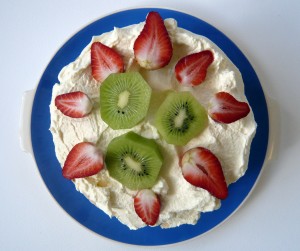 Pavlova is a New Zealand invention, whatever any random Australian may tell you, and as such it’s a dessert that tends to get trotted out whenever Kiwis have overseas visitors.
Pavlova is a New Zealand invention, whatever any random Australian may tell you, and as such it’s a dessert that tends to get trotted out whenever Kiwis have overseas visitors.
As I am the sort of Mum who thinks ice-cream in cones or pieces of fruit are perfectly adequate desserts, it was with more enthusiasm than skill that I recently decided to make a Pav for some international visitors.
This was a good plan. My Mum has an awesome recipe, which involves throwing all the ingredients into a bowl and mixing until done. I also remembered to put the eggs in the hot-water cupboard over night to ensure the meringue meringue-ed properly. I was feeling smug. I should never do that. (more…)
Karyn is a teacher, writer and solo mother to three sons. She lives in the sunny wine region of Hawke’s Bay, New Zealand in the city of Napier.
More Posts

by Karyn Wills | Apr 3, 2013 | Natural Disaster, New Zealand, Parenting, Uncategorized
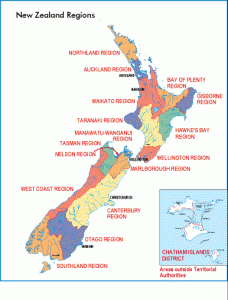 March 5th 2013 was Census Day in New Zealand, and it was the first that our boys were really involved with. This was a re-scheduled Census due to the February 22nd (2011) earthquake in Christchurch, which had put the country into a state of emergency. (8th March 2011 had been the original scheduled date)
March 5th 2013 was Census Day in New Zealand, and it was the first that our boys were really involved with. This was a re-scheduled Census due to the February 22nd (2011) earthquake in Christchurch, which had put the country into a state of emergency. (8th March 2011 had been the original scheduled date)
We hold a Census every five years and it is illegal to not fill in a form or to fill in forms with incorrect information. The data is used by central government, local government, iwi (Maori tribal groups), businesses and community groups for strategic planning and budget allocation. We have the option of filling them out on paper or on line and we can chose to have forms in either English or Maori.
The boys were very excited, and immediately after dinner was cleared away, the one (how does that happen?) blue pen in the house was found. It was heartening to see the older boys both knew their full names, address, previous address, dates of birth etc and the three year-old was able to tell me his full name too. On asking him where he lived, he looked at me as if I had gone insane and said, Here. When I asked him where he used to live, he said matter of factly, “In our town house.” (I must work on that – the other two could easily rattle off their address and phone number at the same age.) (more…)
Karyn is a teacher, writer and solo mother to three sons. She lives in the sunny wine region of Hawke’s Bay, New Zealand in the city of Napier.
More Posts

 I have three sons and they are a lot of fun. They are also a lot of noise, mess and busyness.
I have three sons and they are a lot of fun. They are also a lot of noise, mess and busyness.







 Pavlova is a New Zealand invention, whatever any random Australian may tell you, and as such it’s a dessert that tends to get trotted out whenever Kiwis have overseas visitors.
Pavlova is a New Zealand invention, whatever any random Australian may tell you, and as such it’s a dessert that tends to get trotted out whenever Kiwis have overseas visitors.
 March 5th 2013 was Census Day in New Zealand, and it was the first that our boys were really involved with. This was a re-scheduled Census due to the February 22nd (2011) earthquake in Christchurch, which had put the country into a state of emergency. (8th March 2011 had been the original scheduled date)
March 5th 2013 was Census Day in New Zealand, and it was the first that our boys were really involved with. This was a re-scheduled Census due to the February 22nd (2011) earthquake in Christchurch, which had put the country into a state of emergency. (8th March 2011 had been the original scheduled date)


